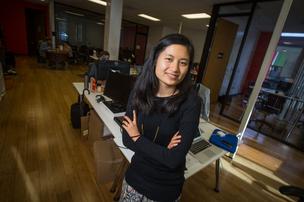Lark takes on the Fitbits of the world using artificial inte
Source: Angela Swartz
 Step counters. Sports bras with heart-rate monitors. A sleep and activity tracker for your dog.
Step counters. Sports bras with heart-rate monitors. A sleep and activity tracker for your dog.
The profusion of wearable devices may create an $11.61 billion market by 2020, according to the market research firm MarketsandMarkets. But the smartphones carried by 58 percent of people in the U.S. pose a potent threat to the Fitbits and Jawbones of the world.
Smartphone apps made by both industry goliaths like Apple Inc. and Silicon Valley startups like Mountain View-based Lark have the potential to replace fitness monitors for many uses, particularly in the health field.
Formerly focused on a sleep-monitoring wearable, four-year-old Lark has shifted its focus to the mobile health app market. That industry, still in its infancy, currently generates under $100 million annually in downloads and in-app purchases, according to Harry Wang, director of health and mobile product research for market researcher Park Associates. In the U.S., the health-app business is expected to evolve away from simple downloads and toward premium purchase and subscription services like coaching, Wang said.
Lark is creating something of a meta-app that pulls fitness, sleep and nutrition data from 54 third-party apps and the Apple Health app. It tracks running, walking and biking using the iPhone 5S and 6's low-power sensors.
The app's pairing with the smartphone also gives it capabilities a purpose-built wearable might lack. Rather than simply dumping data into a graph, Lark uses phone functionality to talk to users, sending feedback on how to lose weight or sleep better. Lark also nudges you to get up if you've been sitting for too long.
"There have been thousands and thousands of wearables in the last two years and we're focused on being that AI (artificial intelligence) layer on top of all of these devices," Lark CEO Julia Hu said.
None of this would be possible without Apple's HealthKit, which allows developers to access health data that users choose to share. For example, you can automatically share data from your diabetes app with your doctor or share nutrition information with fitness apps. Strava, Map My Run, Yummly and others also integrate with HealthKit. Another company moving to pure software is Nike, which discontinued its FuelBand wearable to shift to apps.
"We took a gamble on HealthKit and lucked out," said Hu, who founded Lark.
Wang thinks Lark is on the right track. It's focused on giving personalized tips after management realized it can win bigger margins moving away from hardware, he said.
"They over time realized the bigger market is the overall wellness industry," Wang said. "Over the last 10 to 15 years, we've been talking about the value of health data and we've needed a company to provide a holistic view of data ― not only about lab results or encounters with doctors."
The question remains: How will small health apps like Lark, which is free, become profitable? Lark declined to disclose revenue information or its number of users. To date the 20-employee company has raised $12 million from Fenox Capital, Marvell Technology Group president and co-founder Weili Dai and Deebek Ventures.
In a fast-moving field occupied by giants like Apple as well as a profusion of startups, rising above the crowd is difficult.
"It's a very tall order," Wang said. "No one has been able to do that in a way that's cost-effective. … If they can prove their technology can really improve nutrition and help people achieve better lifestyle goals, those will help them justify the premium services they offer."
Lark, which plans to make its app available soon on Android, faces an army of current and potential competitors including Microsoft Corp. and Google Inc.'s Fit, Wang said. Samsung is working on its own fitness tracker called S Health.
Other smaller competitors with coaching feedback include San Francisco-based Runkeeper and Human, an iOS app that uses GPS to encourage users to walk for 30 minutes a day.
"You will see some other companies doing similar things as well," Wang said. "Not only providing their own data, but work with third-party vendors for more robust data."
| }
|